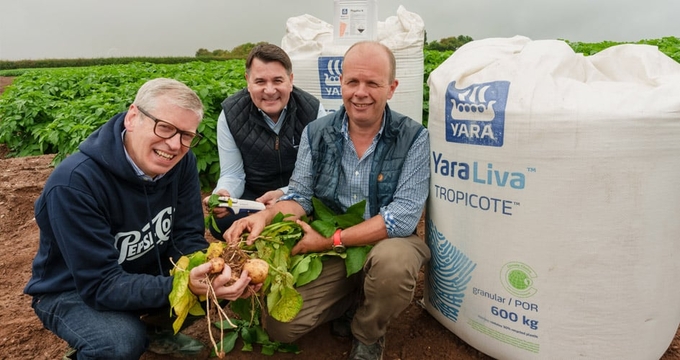June 18, 2025 | 04:17 GMT +7
June 18, 2025 | 04:17 GMT +7
Hotline: 0913.378.918
June 18, 2025 | 04:17 GMT +7
Hotline: 0913.378.918

Yara will deliver up to 165,000 tons of fertilizer per year to PepsiCo. Photo: Yara.
As part of the partnership, which spans multiple countries, participating PepsiCo Europe farmers will be equipped with best-in-class crop nutrition products and advice as well as precision farming digital tools. This will allow them to increase nutrient use efficiency (NUE), boost yields and reduce the carbon footprint of their crops. Yara, the leading crop nutrition company in Europe, will supply PepsiCo with the products and services.
Yara will deliver up to 165,000 tons of fertilizer per year to PepsiCo, covering around 25% of their crop fertilizer needs in Europe by 2030. These fertilizers will be mostly Yara Climate Choice fertilizers, which include low-carbon footprint fertilizers produced from either renewable ammonia (Herøya, Norway) or low-carbon ammonia via carbon capture and storage (CCS), currently under construction in Yara Sluiskil.
The mix will also include Yara’s standard premium nitrate-based mineral fertilizers produced using natural gas, which have a carbon footprint that is around 50% lower than most non-EU fertilizers thanks to the use of catalyst technology. The aim of the partnership is to upgrade to Yara Climate Choice fertilizers over time as production scales up and technologies mature so that all of the 165,000 p.a. tons are Yara Climate Choice fertilizers by 2030.
The collaboration underlines the companies’ shared commitment to building a more sustainable food system in line with the European Union’s climate targets. At the same time, it will support farmers through transition costs to ensure their livelihoods are not adversely impacted.
The partnership, which will help drive the adoption of regenerative agricultural practices, will include approximately 1,000 farms, covering a total of around 128,000 hectares across the European Union and the UK. Efforts will initially focus on potatoes, a key crop for PepsiCo, and then expand to other crops such as oats and corn.
Fertilizers are the biggest opportunity to reduce emissions as fertilizer production and in-field emissions account for half of PepsiCo’s average potato carbon footprint in Europe.
Translated by Quynh Chi

(VAN) Extensive licensing requirements raise concerns about intellectual property theft.

(VAN) As of Friday, a salmonella outbreak linked to a California egg producer had sickened at least 79 people. Of the infected people, 21 hospitalizations were reported, U.S. health officials said.

(VAN) With the war ongoing, many Ukrainian farmers and rural farming families face limited access to their land due to mines and lack the financial resources to purchase needed agricultural inputs.

(VAN) Vikas Rambal has quietly built a $5 billion business empire in manufacturing, property and solar, and catapulted onto the Rich List.

(VAN) Available cropland now at less than five percent, according to latest geospatial assessment from FAO and UNOSAT.

(VAN) Alt Carbon has raised $12 million in a seed round as it plans to scale its carbon dioxide removal work in the South Asian nation.

(VAN) Attempts to bring down the price of the Japanese staple have had little effect amid a cost-of-living crisis.